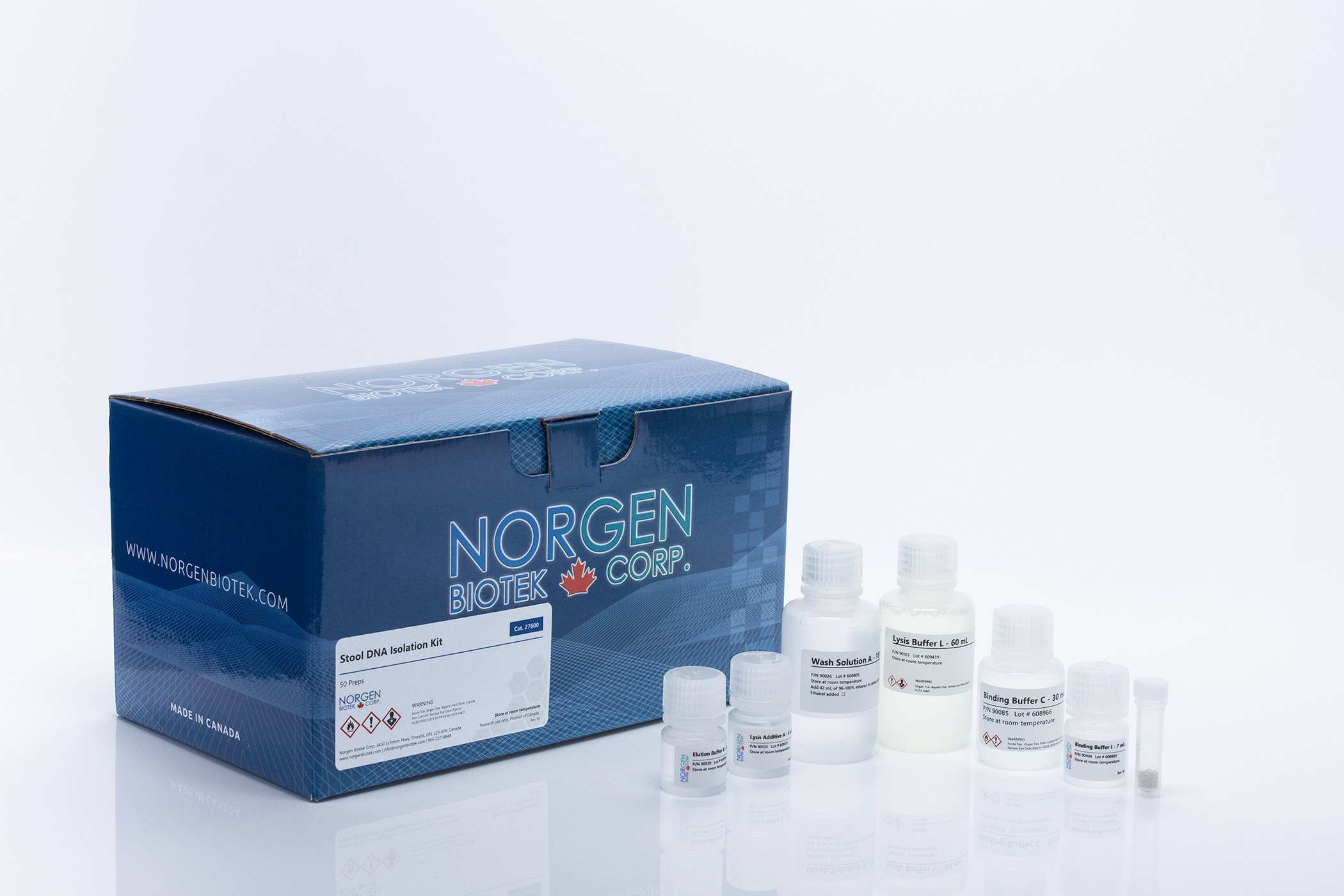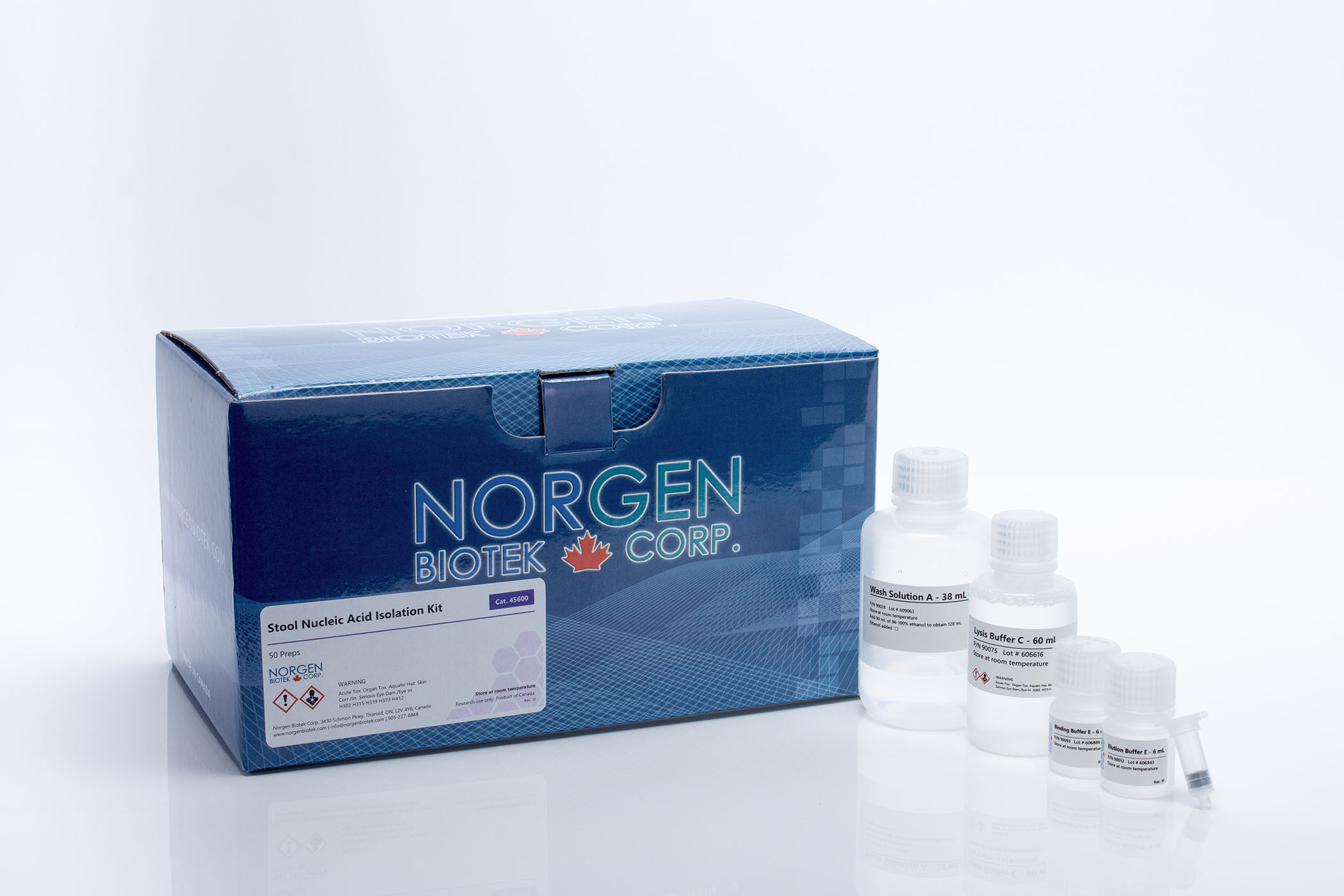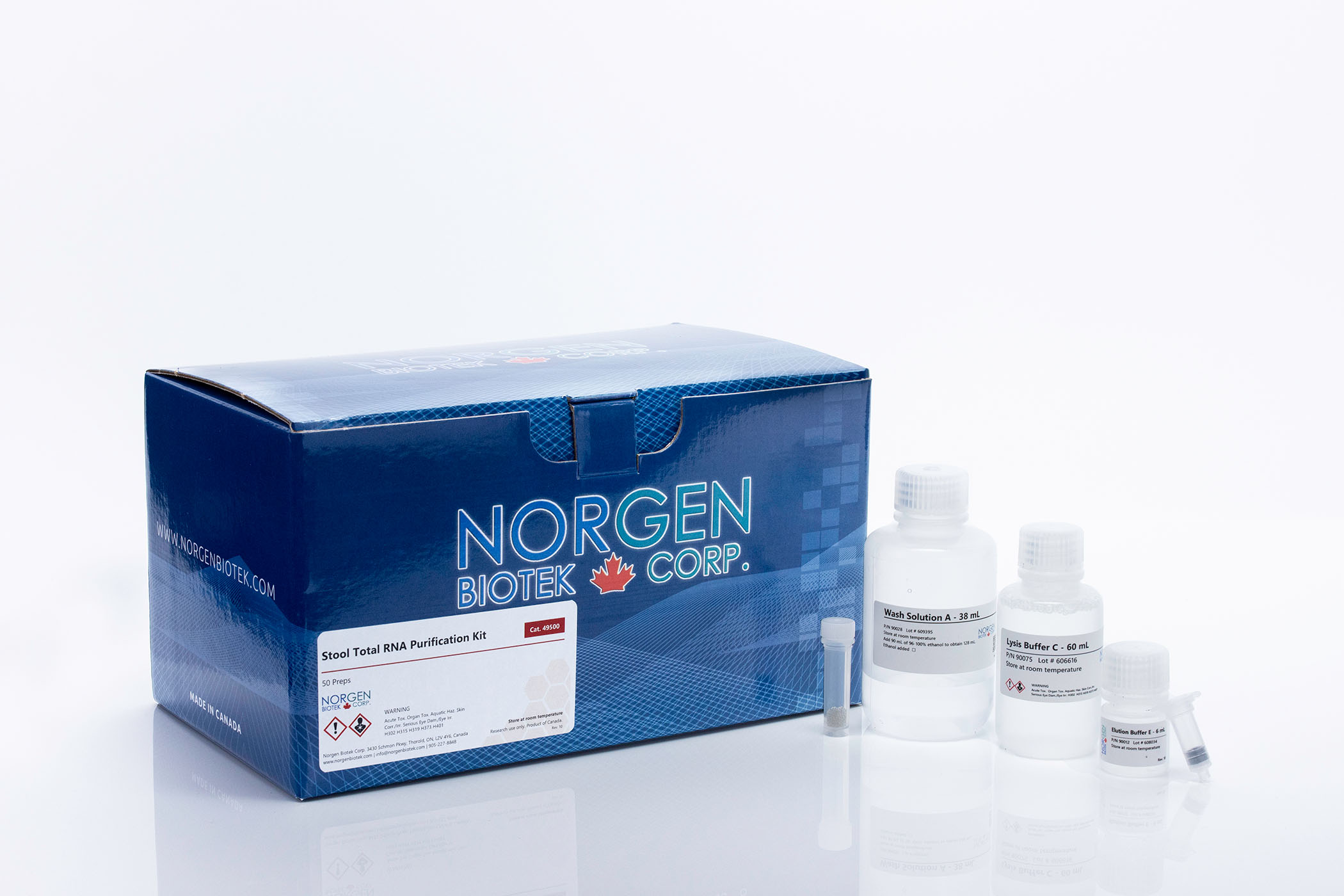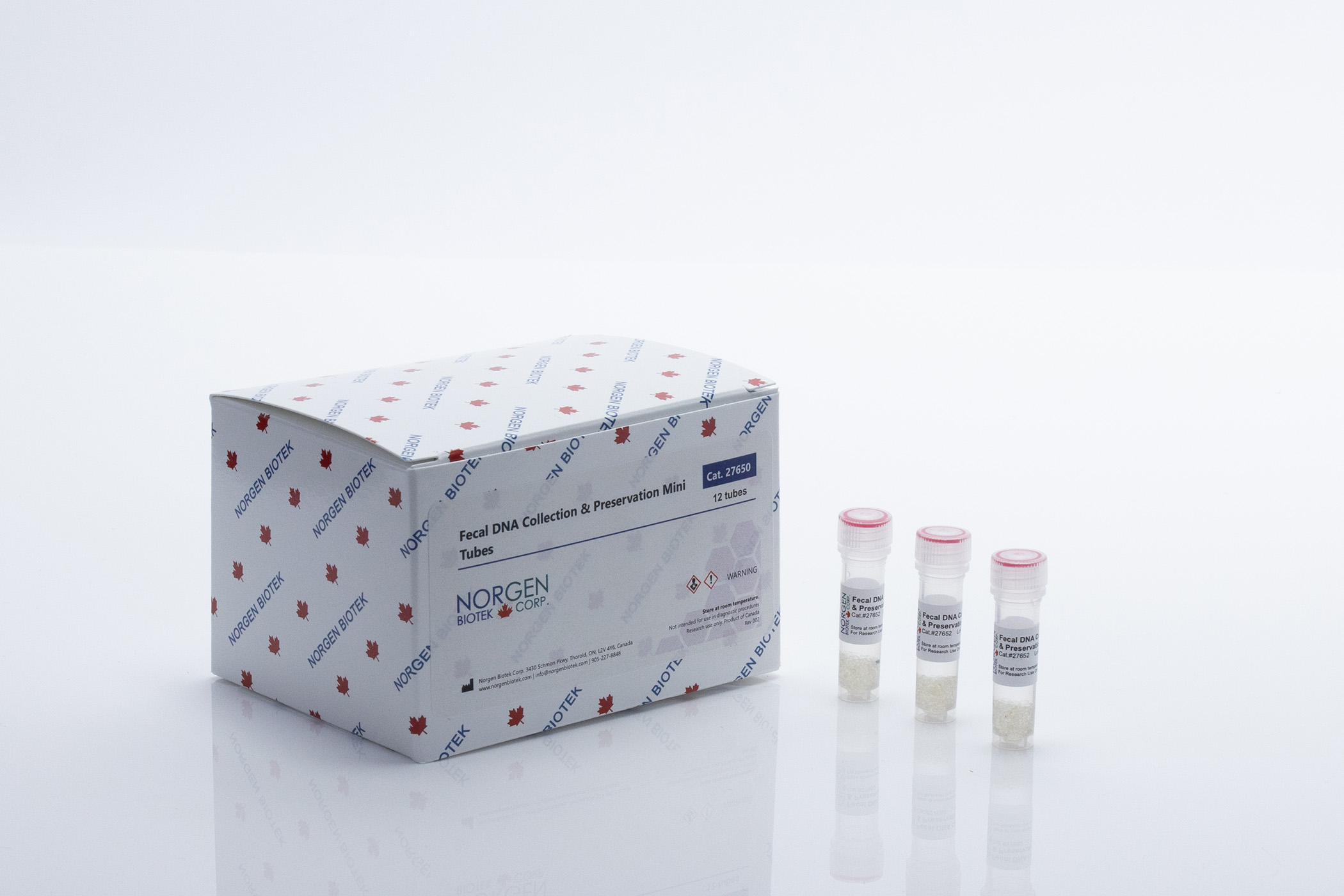Stool Nucleic Acid Collection and Preservation Tubes
A rapid and simple method for the collection, preservation and room temperature shipping of stool samples.
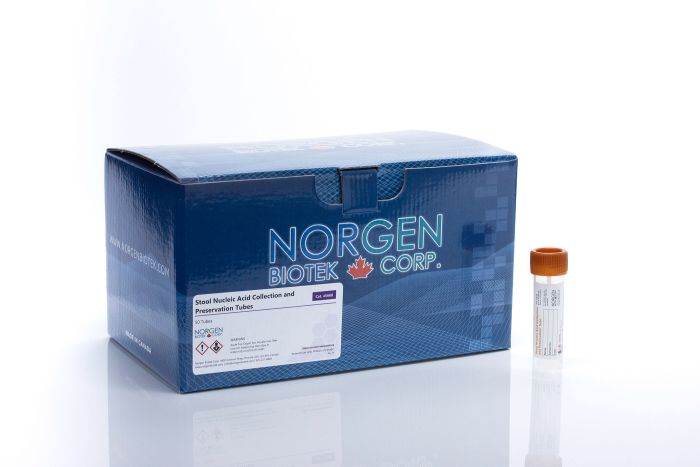
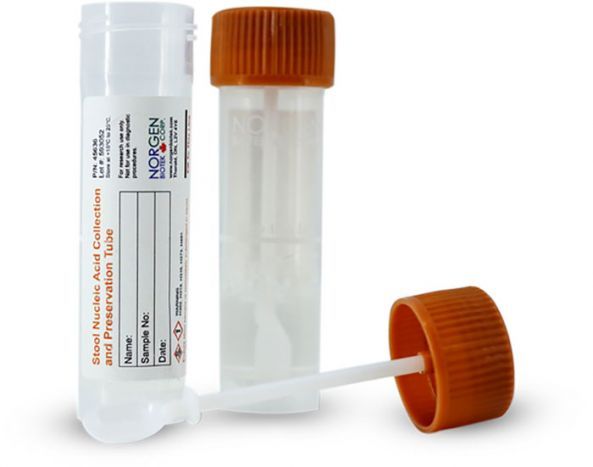
Stool Nucleic Acid Collection and Preservation Tubes
A rapid and simple method for the collection, preservation and room temperature shipping of stool samples.
Register today to receive an exclusive 15% off* on your first order.
Features and Benefits
-
Sample Homogeneity:
Eliminates sample variability.
-
Inactivating:
Renders the sample non-infectious by preventing bacterial/fungal growth and inactivating viruses; eliminates odor.
-
Ambient Temperature Preservation:
Preservation for over 2 years for DNA and 7 days for RNA at room temperature.
-
Cost-Effective:
No cold shipping or storage required.
-
Robust Preservation:
Effective over a range of temperatures.
-
Freezer Compatible:
The tubes can be stored at -80°C to extend the stabilization of nucleic acids for longer periods.
DNA and RNA Isolation: Compatible with multiple isolation methods, including Norgen's Stool DNA, RNA and total nucleic acid isolation kits.
Microbiome profiling: A reliable and reproducible source of sample for microbial detection or metagenomics analysis via NGS, qPCR, ddPCR and other applications.
Metabolomics: Preserved stool samples are compatible with SCFA and metabolomic analysis according to literature.
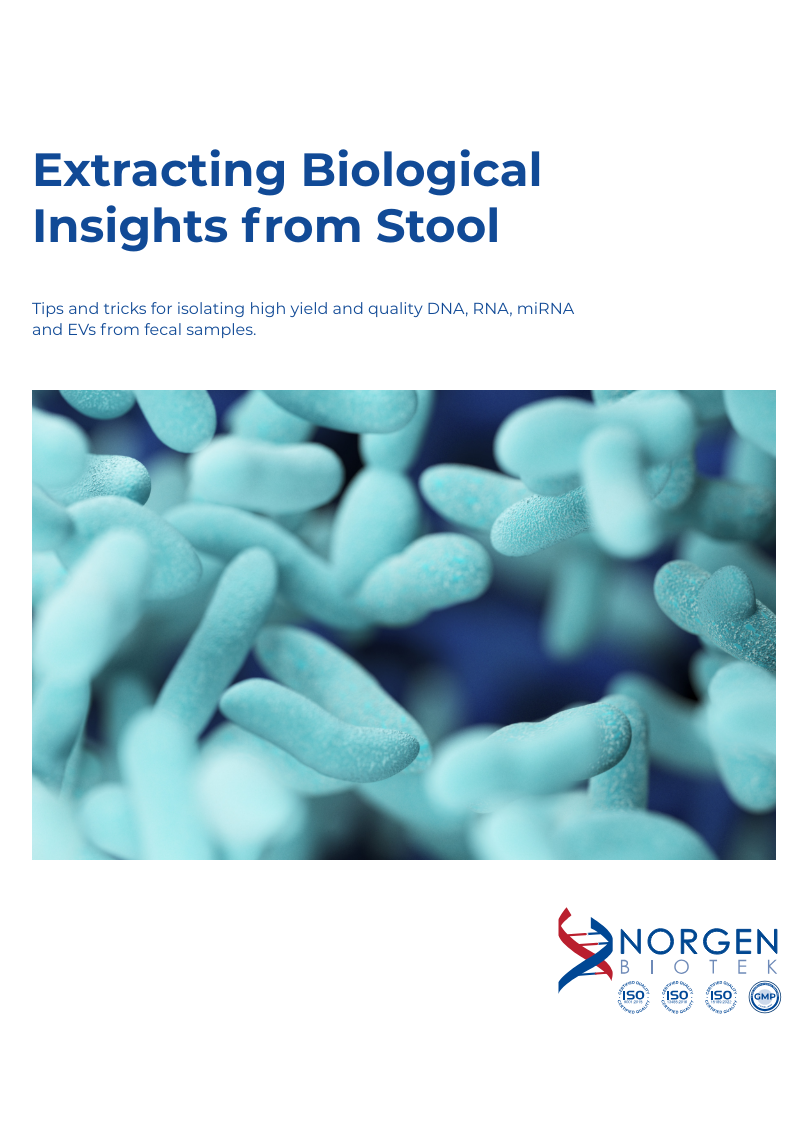
Free Download
Extracting Biological Insights from Stool
Tips and tricks for isolating high yield and quality DNA, RNA, miRNA and EV's from fecal samples
Download for FreeDetails
Supporting Data
Figure 1. Norgen's Best-In-Class Preservation. Summary of community shifts in response to stabilizing solutions over a 14-day storage period. Bray-Curtis distance towards the reference for each patient grouped by stabilizing solution. Median and 5th-to-95th percentile ranges are shown for both interaliquot and interpatient variability (adapted from Plauzolles et al, 2022). Norgen is the most similar to frozen stool samples, over 11 other sample collection and storage methods.
Figure 2. Integrity of Total Stool DNA and RNA Isolated from Preserved Stool Samples. DNA and RNA were isolated from 200 µL of preserved stool from 4 different donors (lanes A to D) stored at room temperature at the indicated time points (DNA at 27 months and RNA at 7 days) using Norgen's Stool Nucleic Acid Isolation Kit (Cat# 45600). Next, 10 µL from the 75 µL eluted nucleic acid was loaded onto a gel for visual analysis. High integrity stool DNA was isolated from preserved stool samples that were stored at room temperature for 27 months, and high integrity RNA was isolated from stool samples stored for 7 days at ambient temperature. Lane M is Norgen's HighRanger 1 kb DNA Ladder (Cat. 11900).
Figure 3. Monitoring the DNA stability of Adenovirus (Ad5subE1) Spiked into Preserved Stool Samples using TaqMan Real-Time PCR Assay. Preserved stool samples were spiked with 6 x 109 pfu/mL of Adenovirus, and 200 µL samples were removed at the indicated time points. The stool DNA was then isolated using Norgen's Stool DNA Isolation Kit (Cat# 27600). Next, 2 µL of DNA template from each 50 µL of elution was used in a 20 µL PCR reaction to detect the Adenovirus DNA. The stool preservative was shown to stabilize Adenovirus DNA up to 21 weeks at ambient temperature, indicating that Norgen's Stool Nucleic Acid Collection and Preservation Tubes provide a safe and convenient sample transportation system.
Figure 4. Hierarchical Clustering of Stool Samples at Phylum Level Under Different Storage Conditions. The microbial composition from the stool samples preserved in Norgen’s Stool Nucleic Acid Collection and Preservation Tubes (Cat. 45630, 45660) did not differ significantly to that of controls (fresh stool from Day 0 at RT) over a 2 day period while non-preserved stool samples showed a distance in the dendrogram from the original stool profile.
Figure 5. Difference In Top 5 Abundant Microorganisms at Phylum Level Compared to Fresh Stool (Day 0). Abundance of Firmicuties, Bacteroidetes and proteobacteria from the preserved stool sample was higher than non-preserved (NP) to the fresh stool after 2 days storage at RT, indicating that the originality of microorganism profile from the preserved are much closer to the fresh stool sample (Day 0).
Figure 6. Relative Abundance of Bacterial Genera Between Preserved And Non-preserved Stool Sample Stored at RT For 2 Days. Preserved stool sample using Norgen’s Stool Nucleic Acid Collection and Preservation Tubes (Cat. 45630, 45660) showed closed relativeness to the fresh stool sample (Day 0).
Figure 7. Correlation between duplicate bacterial metagenomic reads using (A) Fresh stool (day 0) and preserved stool at RT for 2 days and (B) Fresh stool (day 0) and non-preserved stool at RT for 2 days. A greater R2 was observed for Fresh stool (day 0) and preserved stool, suggestive of higher consistency between fresh stool sample and preserved stool sample
|
Kit Specifications
|
|
|
Stool Input
|
2 g
|
| Stability of Stool Nucleic Acids at Room Temperature |
2 years for DNA
7 days for RNA* |
* The RNA stability will vary depending on the samples
Storage Conditions and Product Stability
All tubes should be kept tightly sealed and stored at room temperature (15 – 25 °C) for 2 years after the date of shipment without any reduction in performance.
|
Kit Components |
Cat. 45660 |
|---|---|
|
Stool Nucleic Acid Collection and Preservation Tubes |
50 |
|
Product Insert |
1 |
Documentation
Purification and Detection of Bacterial RNA From Preserved Stool Samples - Application Note
Comparative Microbiome Profiles from Fecal Preservation Methods
Gut Microbiome Diversity: Comparison of Stool DNA Preservation Methods
Immediate Viral Inactivation Using Norgen’s Stool Nucleic Acid Preservative
Automation of Stool DNA Isolation on the Hamilton Vantage Using Norgen’s Magnetic Bead Stool Isolation Kit
FAQs
Each tube contains 4 mL (~4.56 grams) of preservative. The scoop is attached to the tube cap for easily collecting and depositing the sample.
The dimensions of each stool collection tube are 76mm (height) x 20mm (diameter).
Tube material is as follows:
- Cap: High Density Polyethylene (HD-PE)
- Stem: Polystyrene (PS)
- Tube: Polypropylene (PP)
Norgen's Stool DNA Isolation Kit, Stool Total RNA Purification Kit, and Stool Nucleic Acid Isolation Kit can be used with fresh stool samples or samples preserved with Stool Collection and Preservation Tubes.
Yes, the preserved stool is compatible for analyses of all these metabolites. This answer is based on several independent academic research articles that used our preservation system and then analyzed the samples for various metabolites. Please contact our technical support team at support@norgenbiotek.com and ask for reference publications.
Yes, Please contact our technical support team at support@norgenbiotek.com and ask for reference publications.
Yes, microRNA is also preserved after stool is properly homogenized with the preservative. Please contact our technical support team at support@norgenbiotek.com and ask for reference publications.
According to protocol, the tube can be store between -20°C to -70°C in order to stabilize the RNA for longer period of time. Alternatively, the end-user can aliquot the small volume of homogeneous mixture (after sample collection and mixing) from the stool tube to microcentrifuge tube and then store at -80°C. This aliquoting method also prevents the multiple freeze and thaw cycles that may impact on RNA quality.
Citations
| Title | Exploring the gut DNA virome in fecal immunochemical test stool samples reveals associations with lifestyle in a large population-based study |
| Citation | Nature communications 2024. |
| Authors | Paula Istvan, Einar Birkeland, Ekaterina Avershina, Ane S. Kværner, Vahid Bemanian, Barbara Pardini, Sonia Tarallo, Willem M. de Vos, Torbjørn Rognes, Paula Berstad & Trine B. Rounge |
| Title | The gut microbiome-prostate cancer crosstalk is modulated by dietary polyunsaturated long-chain fatty acids |
| Citation | Nature communications 2024. |
| Authors | Gabriel Lachance, Karine Robitaille, Jalal Laaraj, Nikunj Gevariya, Thibault V. Varin, Andrei Feldiorean, Fanny Gaignier, Isabelle Bourdeau Julien, Hui Wen Xu, Tarek Hallal, Jean-François Pelletier, Sidki Bouslama, Nadia Boufaied, Nicolas Derome, Alain Bergeron, Leigh Ellis, Ciriaco A. Piccirillo, Frédéric Raymond, Yves Fradet, David P. Labbé, André Marette & Vincent Fradet |
| Title | MicroRNAs from edible plants reach the human gastrointestinal tract and may act as potential regulators of gene expression |
| Citation | Journal of Physiology and Biochemistry 2024. |
| Authors | Ester Díez-Sainz, Fermín I. Milagro, Paula Aranaz, José I. Riezu-Boj & Silvia Lorente-Cebrián |
| Title | Gut-microbiome profiles among Soil-transmitted helminths (STHs) infected Ethiopian children enrolled in the school-based mass deworming program |
| Citation | PLOS NEGLECTED TROPICAL DISEASES 2024. |
| Authors | Bineyam Taye ,Zeleke Mekonnen,Kenneth D. Belanger,Emily R. Davenport |
| Title | Fecal Coprococcus, Hidden behind Abdominal Symptoms in Patients with Small Intestinal Bacterial Overgrowth |
| Citation | Preprint Research Square 2024. |
| Authors | Huaizhu Guo, Yuzhu Chen, Wenxin Dong, Siqi Lu, Yanlin Du, Liping Duan |
| Title | A 6-month exercise intervention clinical trial in women: effects of physical activity on multi-omics biomarkers and health during the first wave of COVID-19 in Korea |
| Citation | BMC Sports Science, Medicine and Rehabilitation 2024. |
| Authors | JooYong Park, Jaemyung Kim, Jihyun Kang, Jaesung Choi, Ji-Eun Kim, Kyung-Joon Min, Seong-Woo Choi, Joo-Youn Cho, Miyoung Lee & Ji-Yeob Choi |
| Title | Dysbiotic signatures and diagnostic potential of gut microbial markers for inflammatory bowel disease in Korean population |
| Citation | Scientific Reports 2024. |
| Authors | Hyun Sik Kim, Shin Ju Oh, Byung Kwon Kim, Ji Eun Kim, Bo-Hyung Kim, Young-Kyu Park, Bo-Gie Yang, Jae Yun Lee, Jin-Woo Bae & Chang Kyun Lee |
| Title | Association between gut microbiota development and allergy in infants born during pandemic-related social distancing restrictions |
| Citation | Allergy 2024. |
| Authors | Katri Korpela1,2 | Sadhbh Hurley3,4 | Sinead Ahearn Ford2 | Ruth Franklin3 | Susan Byrne3,4 | Nonhlanhla Lunjani2 | Brian Forde2,5 | Ujjwal Neogi6 | Carina Venter7 | Jens Walter2,5,8 | Jonathan Hourihane3,4 | Liam O'Mahony |
| Title | Differences in dietary patterns related to metabolic health by gut microbial enterotypes of Korean adults |
| Citation | Frontiers in Nutrition 2023. |
| Authors | Hwan-Hee Jang, Hwayoung Noh, Gichang Kim, Su-Yeon Cho, Hyeon-Jeong Kim, Jeong-Sook Choe, Jeongseon Kim, Augustin Scalbert, Marc J. Gunter, Oran Kwon and Kyesook Kim |
| Title | Dysregulated Immunity to Clostridioides difficile in IBD Patients Without a History of Recognized Infection |
| Citation | Inflammatory Bowel Diseases 2023. |
| Authors | Laura Cook, May Q Wong, William D Rees, Alana Schick, Daniel J Lisko, Genelle R Lunken, Xiaojiao Wang, Hannah Peters, Laura Oliveira, Torey Lau, Regan Mah, Brian Bressler, Megan K Levings, Theodore S Steiner |


